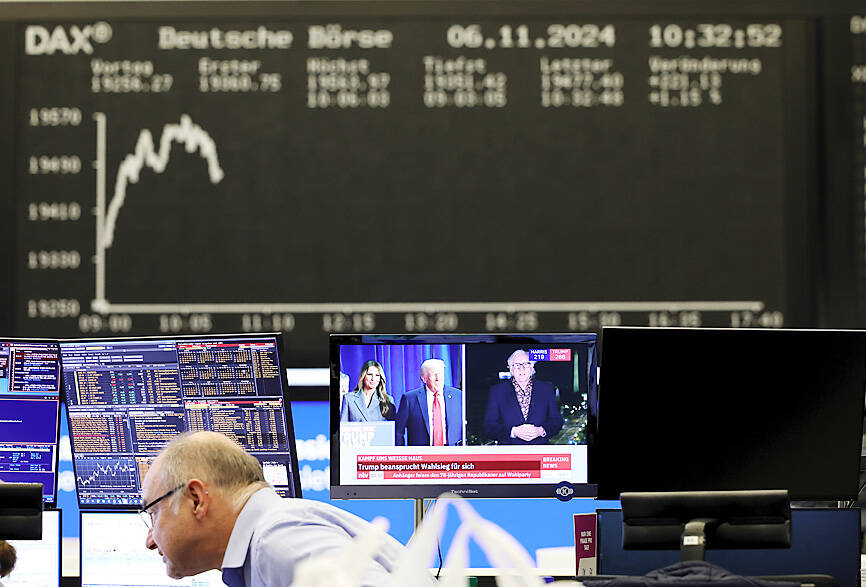The US dollar surged and bitcoin hit a record high yesterday before former US president Donald Trump claimed victory in the US election, with traders ramping up bets on fresh tax cuts, tariffs and rising inflation.
While polls had shown the race on a knife edge, the Republican fared far better than his Democratic opponent, US Vice President Kamala Harris, as results rolled in.
Both candidates picked up expected wins in safe states, but indications that the business tycoon was on course for a second term boosted the so-called “Trump trade.”

Photo: EPA-EFE
News that the former president’s party had won control of the Senate also boosted the prospect of sweeping tax cuts, more tariffs and deregulation — seen as a boost for the greenback.
The US dollar jumped 1.5 percent to ¥154.38, its highest since July, and was also up more than 1 percent against the euro and more than 3 percent against the Mexican peso.
Bitcoin sprung US$6,000 higher to a record US$75,371.69, topping its previous peak of US$73,797.98 in March.
Trump has pledged to make the US the “bitcoin and cryptocurrency capital of the world” and to put tech billionaire Elon Musk in charge of a wide-ranging audit of governmental waste.
Investors are “potentially taking the view that a Republican victory would lead to a surge in demand for the digital currency,” AJ Bell PLC analyst Russ Mould said.
Analysts said a clean sweep of Congress and the White House for Trump and Republicans would likely boost the US dollar and Treasury yields, owing to his plans to cut taxes and impose tariffs on imports.
“The markets are scrambling to figure out what happens next, but for the time being, the market is pricing in a higher growth and higher inflation outlook,” Esho Capital economist and founder Peter Esho said.
“Trade and tariffs and taxation would be the three Ts of the Trump Trade, followed by deregulation,” said Neil Wilson, chief market analyst at Finalto trading group.
However, he added: “Bear in mind as a caveat that the House is still up for grabs and Trump had complete control of Congress last time and it didn’t mean he could do everything he said he would.”
Such an outcome could provide a headache for US Federal Reserve Chairman Jerome Powell as he continues his battle to bring inflation to heel, with Trump’s plans considered inflationary.
The election comes as the central bank prepares to deliver its latest policy decision Thursday amid expectations it would cut interest rates by 25 basis points, having lowered them by 50 points in September.
The US dollar’s surge against the yen rallied stocks more than 3 percent in Tokyo at one point thanks to gains in exporters, while markets in Sydney, Singapore, Taipei, Mumbai and Bangkok also rose.
However, there were losses in Shanghai, Seoul, Wellington, Manila and Jakarta.
Hong Kong was also well down — at one point diving almost 3 percent — on worries about the impact of a Trump presidency on China’s economy and relations between Beijing and Washington.
London, Paris and Frankfurt all rose at the open.
US stock futures rose sharply hours before the opening of markets yesterday.
Futures — essentially bets on what the price of a stock would be at a later date — were up 2.2 percent for the Dow, 2 percent for the broad-based S&P 500 and 1.7 percent for the tech-heavy Nasdaq.

In Italy’s storied gold-making hubs, jewelers are reworking their designs to trim gold content as they race to blunt the effect of record prices and appeal to shoppers watching their budgets. Gold prices hit a record high on Thursday, surging near US$5,600 an ounce, more than double a year ago as geopolitical concerns and jitters over trade pushed investors toward the safe-haven asset. The rally is putting undue pressure on small artisans as they face mounting demands from customers, including international brands, to produce cheaper items, from signature pieces to wedding rings, according to interviews with four independent jewelers in Italy’s main

Macronix International Co (旺宏), the world’s biggest NOR flash memory supplier, yesterday said it would spend NT$22 billion (US$699.1 million) on capacity expansion this year to increase its production of mid-to-low-density memory chips as the world’s major memorychip suppliers are phasing out the market. The company said its planned capital expenditures are about 11 times higher than the NT$1.8 billion it spent on new facilities and equipment last year. A majority of this year’s outlay would be allocated to step up capacity of multi-level cell (MLC) NAND flash memory chips, which are used in embedded multimedia cards (eMMC), a managed

Japanese Prime Minister Sanae Takaichi has talked up the benefits of a weaker yen in a campaign speech, adopting a tone at odds with her finance ministry, which has refused to rule out any options to counter excessive foreign exchange volatility. Takaichi later softened her stance, saying she did not have a preference for the yen’s direction. “People say the weak yen is bad right now, but for export industries, it’s a major opportunity,” Takaichi said on Saturday at a rally for Liberal Democratic Party candidate Daishiro Yamagiwa in Kanagawa Prefecture ahead of a snap election on Sunday. “Whether it’s selling food or

In the wake of strong global demand for AI applications, Taiwan’s export-oriented economy accelerated with the composite index of economic indicators flashing the first “red” light in December for one year, indicating the economy is in booming mode, the National Development Council (NDC) said yesterday. Moreover, the index of leading indicators, which gauges the potential state of the economy over the next six months, also moved higher in December amid growing optimism over the outlook, the NDC said. In December, the index of economic indicators rose one point from a month earlier to 38, at the lower end of the “red” light.